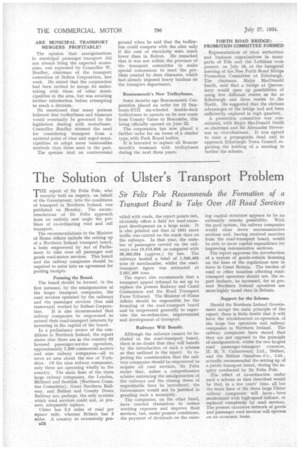The Solution of Ulster's Transport Problem T HE report of Sir
Page 42

If you've noticed an error in this article please click here to report it so we can fix it.
Felix Pole, who recently held an inquiry, on behalf of the Government, into the conditions of transport in Northern Ireland, was published on Monday. The recommendations of Sir Felix approach from an entirely new angle the problem of co-ordinating road and rail transport.
The recommendations to the Minister of Home Affairs include the setting up of a Northern Ireland transport board, a body empowered by Act of Parliament to take over all passenger and goods road-motor services. This board and the railway companies should be required to enter into an agreement for pooling receipts.
Forming the Board.
The board should be formed, in the first instance, by the amalgamation of the larger transport companies, the road services operated by the railways and the passenger services (bus and tramways) worked by Belfast Corpora tion. It is also recommended that railway Companies be empowered to extend their road-transport interests by investing in the capital of the board.
In a preliminary review of the conditions in Northern Ireland, the report states that there are in the country 52 licensed passenger-service operators, approximately 7,300 commercial motors and nine railway companies—all to serve an area about the size of Yorkshire. Of the nine railway companies, only three are operating wholly in the country. The main lines of the three large railway companies, the London, Midland and Scottish (Northern Counties Committee), Great Northern Railway, and Belfast and County Down Railway are, perhaps, the only systems which road services could not, at present, adequately replace.
Ulster has 2.5 miles of road per square mile, whereas Britain has 2 miles. A country so extensively pro
B24 vided with roads, the report points out, obviously offers a field for road-transport development on a large scale. It is also pointed out that in 1931 more traffic was carried on the roads than on the railways. In that year, the number of passengers carried on the railways was 10,515,856, as compared with 38,495,934 (approx.) by bus. The railways hauled a total of 1,340,495 tons of merchandise, whilst the roadtransport figure was estimated at 2,051,400 tons.
The report also recommends that a transport appeal tribunal be set up to replace the present Railway and Canal Commission and the Road Transport Fares Tribunal. The Minister of Home Affairs should be responsible for the founding of the road-transport board and be empowered generally to supervise the co-ordination, improvement and development of transport.
Railways Will Benefit.
Although the railways cannot be included in the road-transport board, there is no doubt that they will benefit by the introduction of such a scheme as that outlined in the report. In rejecting the consideration that the railway companies should be empowered to acquire all road services, Sir Felix states that, unless a comprehensive scheme embracing the amalgamation of the railways and the closing down of unprofitable lines be introduced, the Government would not be justified in granting such a monopoly.
The companies, on the other hand, have exerted themselves to reduce working expenses and improve their services, but, under present conditions, the payment of dividends on the exist ing capital structure appears to be an extremely remote. possibility. With the pool system, the railway companies would close down unremunerative sections and, having received sanction from the road-transport board, would be able to incur capital expenditure for improving remunerative sections.
The report approves the introduction of a system of goods-vehicle licensing on the lines of the regulations now in force in Great Britain. The burden of road or other taxation affecting roadtransport operators should not, the report declares, be increased, for at present Northern Ireland operators are more highly taxed than in Britain.
Support for the Scheme.
Should the Northern Ireland Government accept the main principle of the report, there is little doubt that it will have the wholehearted co-operation of the large bus operators and railway companies in Northern Ireland. The railway companies have stated that they are not opposed to the principle of amalgamation, whilst the two largest road passenger-transport concerns, H. M. S. Catherwood, Ltd., Belfast, and the Belfast Omnibus .Co„ Ltd., actually recommended the setting up of a public transport board, during the inquiry conducted by Sir Felix Pole.
The effect of co-ordination under such a scheme as that described would be that, in a few years' time, all but the main lines of the three large Ulster railway companies will have . been modernized with high-speed railcars. or replaced completely by road services. The present extensive network of goods and passenger road services will operate on an economic basis.




































































































